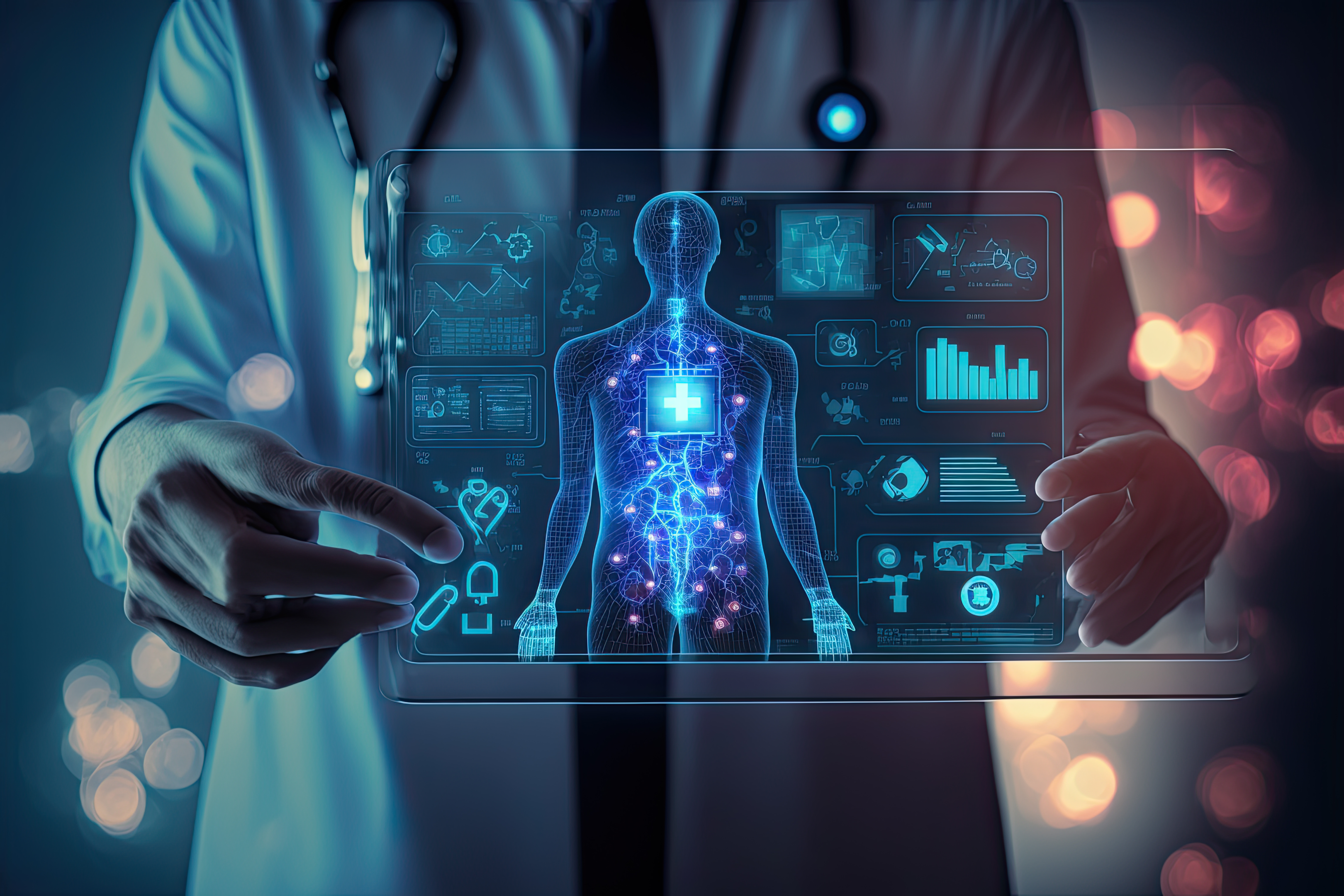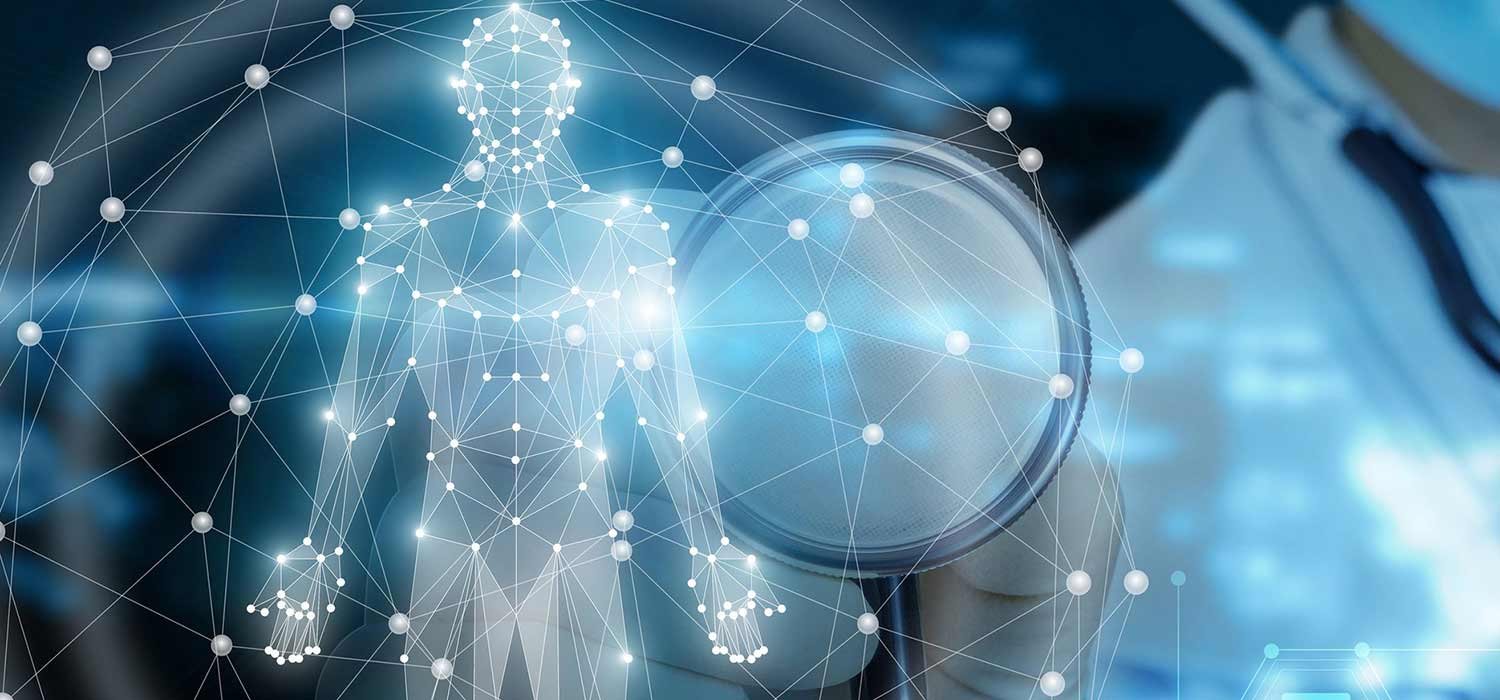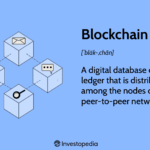AI in healthcare refers to the use of artificial intelligence to improve patient outcomes and streamline medical operations. It encompasses advanced analytics and algorithms that aid in diagnosis, treatment, and management of health conditions.
Artificial intelligence is revolutionizing healthcare with its ability to analyze large amounts of data, providing insights that support clinical decision-making and personalized patient care. This technology enhances diagnostic precision, predicts patient outcomes, and enables more efficient resource management. AI-driven tools, such as machine learning and natural language processing, assist in early disease detection and the development of new treatments, optimizing the overall healthcare journey.
Providers leverage AI to reduce workload and administrative tasks, freeing up more time for patient care. The integration of AI extends to patient monitoring, drug discovery, and risk assessment, making it a critical component in the pursuit of advanced and efficient healthcare services. Despite potential ethical and privacy concerns, the continued advancement of AI in healthcare holds the promise of a more responsive, accessible, and effective medical system.
Introduction To Ai In Healthcare
The healthcare industry stands on the brink of a revolution, thanks in large part to AI. What’s AI, you ask? Think of it as a super-smart helper in doctors’ offices and hospitals. It can read through tons of health info to help doctors make better choices. This peek into AI in healthcare will show you just how big of a deal it really is. Let’s dive in!
The Emergence Of Ai In Healthcare
A few years back, AI in healthcare sounded like sci-fi. Now, it’s real, it’s here, and it’s amazing! Today, AI helps spot diseases early and gives tips on the best treatment plans. From small clinics to big hospitals, AI tools are popping up everywhere.
Understanding Ai: Definitions And Key Concepts
- AI (Artificial Intelligence) – It’s like a robot brain that can learn and think.
- Machine Learning – This is how AI gets smarter by learning from data.
- Natural Language Processing – AI uses this to understand what we say and write.
Think of AI as a clever student that never stops learning. It takes notes from past info and gets better every day.
Potential Of Ai To Transform Healthcare
Imagine a world where AI spots sickness before it’s too late or suggests the perfect medicine for a patient. That world is becoming real. Hospitals can use AI to keep patients safe, cut costs, and find new ways to heal us. AI has the power to make healthcare better for everyone. Cool, right?
Here’s a snap of what AI can do:
- Find tiny signs of big illnesses early
- Read scads of medical records fast
- Help make drugs that fight sickness better

Credit: healthsnap.io
Applications Of Ai In Healthcare
In the dynamic world of healthcare, AI stands as a beacon of progression. It offers smarter, quicker, and more personalized health management. From detecting diseases to customizing treatment plans, AI’s role is transformative. Let’s explore how cutting-edge AI applications revolutionize healthcare.
Diagnostic Procedures
AI elevates diagnostic accuracy and speed. Machine learning algorithms analyze images from X-rays, CT scans, and MRIs. They detect abnormalities often missed by the human eye. This precision leads to earlier intervention and better outcomes.
Treatment Personalization
Treatment once followed a one-size-fits-all approach. Now, AI crafts custom treatment plans. It takes into account each patient’s unique genetic makeup, lifestyle, and medical history. This ensures that care is as individual as the patient receiving it.
Drug Discovery And Development
- Analyzing vast biological datasets for potential drug candidates
- Predicting drug effectiveness and side effects
- Accelerating clinical trials with more precise participant selection
Through these methods, AI significantly cuts the time and cost of bringing new drugs to market.
Managing Medical Data And Health Records
The management of healthcare data is complex. AI simplifies this process. It organizes and analyzes health records for better patient care coordination. With AI, data that once overwhelmed now informs critical healthcare decisions.
Patient Engagement And Adherence
AI doesn’t just assist professionals; it engages patients. Chatbots and virtual health assistants provide personalized reminders for medication and appointments. They track health progress and encourage healthy behavior.
Challenges And Considerations
As we embrace AI in healthcare, it’s crucial to consider various challenges. This section discusses key issues to address for successful AI integration into healthcare.
Data Privacy And Security
Protecting patient data is a top priority. With AI systems processing vast amounts of sensitive information, robust safeguards are essential. Cybersecurity measures must prevent unauthorized access and data breaches. Ongoing vigilance ensures trust and safety for both patients and healthcare providers.
- Encryption of data: Vital for secure communication.
- Access controls: Limit who can view patient information.
- Audit trails: Track data usage and access.
Ethical Implications Of Ai In Healthcare
AI brings ethical questions to the forefront. Decisions made by algorithms can deeply affect lives, so transparency and fairness are critical. Balancing technology with human oversight is key. Ethical AI ensures care quality and equality for all patients.
- Develop unbiased algorithms.
- Ensure AI transparency.
- Maintain human decision-making in critical care.
Integration With Existing Healthcare Systems
Seamless integration is challenging yet necessary. AI must work with current systems to support healthcare staff, not replace them. Smooth interoperability reduces errors and enhances care efficiency.
| Integration Goal | Benefit |
|---|---|
| Compatibility | Ensures AI and existing systems communicate. |
| User-friendly AI | Makes adoption easier for healthcare professionals. |
Regulatory Challenges
Fulfilling regulatory standards is tough. AI in healthcare must comply with laws and guidelines to ensure patient safety. Collaboration with regulators creates clear paths for AI development and deployment.
Staying ahead of evolving regulations is key. Here’s what helps ensure compliance:
- Closely follow healthcare regulations.
- Engage with regulatory bodies.
- Adapt swiftly to regulatory changes.

Credit: www.cio.com
The Future Of Ai In Healthcare
The future of AI in Healthcare sparks a vision brimming with potential. Imagine smarter systems supporting diagnoses and treatment plans. The keyword here isn’t substitution but augmentation. AI aims to enhance the precision and efficiency of healthcare delivery. Let’s explore this future broken down into exciting developments, patient care enhancements, and crucial collaborations.
Predicting Trends And Innovations
Healthcare propels forward with AI’s predictive power. Recent AI algorithms predict patient outcomes with surprising accuracy. This section will check out trending AI tools and their projected impacts.
- Continuous Monitoring: Wearables will detect health changes in real time.
- Genomic Analysis: AI deciphers genetic data for personalized medicine.
- Drug Development: AI speeds up new medication discovery.
AI is poised to transform forecasts into routinely accessible healthcare advances.
Capacity For Ai To Revolutionize Patient Care
In patient care, AI implements extraordinary changes. Central to this revolution is data-driven customization.
| AI Application | Patient Benefit |
|---|---|
| Diagnostics | Quicker, more precise disease detection. |
| Treatment Plans | Tailored strategies enhance recovery. |
| Remote Care | AI expands access, saving time and lives. |
AI’s capacity in healthcare is not imaginery. It’s becoming part of everyday practice.
Collaboration Between Ai Developers And Healthcare Professionals
Success in AI healthcare requires teamwork. AI developers and healthcare experts join minds to create cutting-edge solutions. Their goal: effective, ethical AI tools.
- Exchange Expertise: Both sides share their knowledge pool.
- Address Challenges: Together, they solve complex health issues.
- Set Standards: They establish guidelines for AI in practice.
Teamwork ensures AI’s safe integration into patient care.

Credit: www.foreseemed.com
Frequently Asked Questions On Ai In Healthcare
How Is Ai Being Used In Healthcare?
AI in healthcare streamlines patient care through predictive analytics, enhances diagnosis with image recognition, and personalizes treatment plans with advanced algorithms. It also automates administrative tasks to improve efficiency.
How Is Ai Disrupting The Healthcare Industry?
AI revolutionizes healthcare by improving diagnostics, personalizing treatment, and enhancing drug development. It streamlines patient care with predictive analytics and automates administrative tasks, leading to better outcomes and efficiency.
How Is Ai Used In Healthcare 2023?
AI in healthcare, as of 2023, helps diagnose diseases, optimizes treatment plans, and enhances personalized medicine. It also aids in administrative workflows and predictive analytics for patient care.
How Is Generative Ai Being Used In Healthcare?
Generative AI in healthcare powers drug discovery by predicting molecule interactions. It assists in creating personalized treatment plans and generates synthetic data for research. Moreover, it enhances medical imaging analysis, enabling quicker and more accurate diagnoses.
Conclusion
Embracing AI in healthcare promises a revolution in patient care and medical efficiency. The fusion of technology with health services optimizes diagnoses, personalizes treatments, and streamlines hospital management. As we continue to innovate, the symbiosis between AI and healthcare professionals will only strengthen, leading to unparalleled advancements in medical science.
Embrace this change for a healthier tomorrow.






